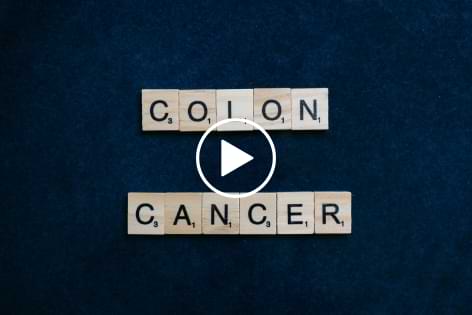
LMU 81 – Unlocking the Link: How Dietary Cholesterol Fuels Colon Cancer Development
Source: Journal Cell Stem Cell (January 2018)
Lifestyle Medicine Update (January 31, 2018)
Introduction
In the intricate realm of human health, the impact of dietary choices continues to captivate researchers and ignite discussions. One of the long-standing debates revolves around the role of dietary fats, particularly animal fats, in influencing the risk of colon cancer. Colon cancer, the second leading cause of cancer-related deaths in developed countries, has consistently piqued the interest of scientists due to its multifaceted origins and impact. For years, studies have pointed to a correlation between high animal fat consumption (excluding fish) and elevated colon cancer rates. Unravelling the intricacies of this relationship, researchers have delved into the mechanisms that underlie the association between animal fat consumption and colon cancer risk. Moreover, recent breakthroughs have uncovered the role of dietary cholesterol as a key player in this intricate puzzle, shedding light on the direct link between cholesterol intake and colon cancer development.
Animal Fat Diet and Colon Cancer: Bridging the Connection
A mounting body of evidence over the years has established a compelling connection between a diet rich in animal fats (excluding fish) and an increased susceptibility to colon cancer. While fish, a source of beneficial omega-3 fatty acids, appears to buck this trend, other sources of animal fat have been implicated in promoting the development of colon cancer. Researchers have dedicated extensive efforts to deciphering the mechanisms that drive this association. Intriguingly, it has been observed that the consumption of high levels of animal fats can trigger the production of secondary sterols and provoke alterations in the gut microflora, both of which have been linked to the progression of colon cancer. These findings open a window into the intricate interplay between dietary choices and the delicate balance of the human gut ecosystem.
Cholesterol: The Silent Culprit
As researchers delved deeper into the labyrinthine landscape of colon cancer development, an intriguing figure emerged on the scene: cholesterol. Beyond its notorious reputation as a cardiovascular risk factor, cholesterol has now been implicated in the realm of colon cancer. A groundbreaking study published in the journal Cell Stem Cell in January 2018 forged a crucial link between dietary cholesterol and the mechanics of colon cancer initiation. What set this study apart was its revelation of the precise mechanism through which dietary cholesterol exacerbates the risk of colon cancer. As one researcher noted, “while the connection between dietary cholesterol and colon cancer is well established, no one has previously explained the mechanism behind it.”
Unlocking the Mechanism: Cholesterol’s Role in Colon Cancer
The study embarked on a transformative journey by utilizing an animal model to dissect the intricate relationship between dietary cholesterol and colon cancer. By subjecting the model to varying levels of dietary cholesterol, the researchers uncovered a remarkable sequence of events. Higher cholesterol intake corresponded to an accumulation of cholesterol within the cell membrane, the outer skin, of colon cells. This accumulation served as a molecular trigger, compelling these cells to undergo accelerated division. With each division, the cells accrued genetic errors at an alarming rate, effectively steering them down the perilous path towards malignancy. Astonishingly, the study revealed that the influence of high dietary cholesterol boosted the formation of tumor cells in the colon by more than a staggering 100-fold.
Elaborating on these findings, the researchers elucidated the process: “as the animals’ cholesterol levels rose, their cells divided more rapidly, causing the tissue lining their guts to expand and their intestines to lengthen. These changes significantly sped up the rate of tumor formation in their colons.” This revelation offered a crucial insight into the interplay between dietary cholesterol, cell division, and the intricate dance of colon cancer development.
A New Paradigm: Dietary Choices and Cancer
The implications of these findings are monumental, painting a vivid picture of the intricate ways in which dietary choices influence the development of colon cancer. As this silent culprit, cholesterol, assumes a prominent role in fuelling cancer progression, it is imperative to reimagine our dietary habits. With colon cancer emerging as a leading cause of mortality, particularly in developed nations, the significance of adopting healthier dietary practices cannot be overstated.
Conclusion: A Call to Action
In the quest to decode the intricate web of factors that drive colon cancer development, researchers have achieved a significant breakthrough by establishing the direct link between dietary cholesterol and malignancy. The study’s revelations underscore the critical importance of adopting dietary habits that minimize cholesterol intake, animal fat consumption, and the consumption of trans-fats and deep-fried foods. The dynamic landscape of nutrition and its impact on human health continues to unveil its secrets, guiding us toward informed choices that hold the potential to transform our well-being.
References
Wang, B., Rong, X., Palladino, E. N. D., Wang, J., Fogelman, A. M., Martín, M. G., … Tontonoz, P. (2018). Phospholipid Remodelling and Cholesterol Availability Regulate Intestinal Stemness and Tumorigenesis. Cell Stem Cell.
https://www.cell.com/cell-stem-cell/fulltext/S1934-5909(17)30519-2
Eat Smart, Live Well, Look Great,
Dr. Meschino

Dr. James Meschino
ABOUT THE AUTHOR
Dr. James Meschino, DC, MS, ROHP, is an educator, author, and researcher having lectured to thousands of healthcare professionals across North America. He holds a Master’s Degree in Science with specialties in human nutrition and biology and is recognized as an expert in the field of nutrition, anti-aging, fitness, and wellness as well as the author of numerous books.

